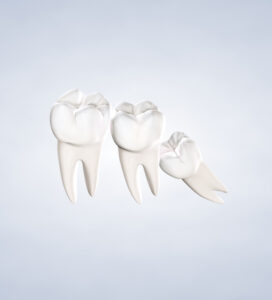 Wisdom teeth removal is a fairly straightforward process when they have fully erupted through the gums. Whey wisdom teeth are impacted, or stuck beneath the gums, more complex surgery is necessary to access and extract them. At Innovative Oral Surgery & Dental Implants, Dr. Michael Salin, Dr. Jared Weiner, Dr. Adam Semanoff, Dr. Bryan Nack, and Dr. Matt Kosakowski regularly extract impacted wisdom teeth in the comfort of our surgical suites.
Wisdom teeth removal is a fairly straightforward process when they have fully erupted through the gums. Whey wisdom teeth are impacted, or stuck beneath the gums, more complex surgery is necessary to access and extract them. At Innovative Oral Surgery & Dental Implants, Dr. Michael Salin, Dr. Jared Weiner, Dr. Adam Semanoff, Dr. Bryan Nack, and Dr. Matt Kosakowski regularly extract impacted wisdom teeth in the comfort of our surgical suites.
Contact our practice in Feasterville, Newtown, or Abington, PA, for a consultation. Our board-certified oral surgeons will evaluate your oral health and determine if you have impacted wisdom teeth and create a plan to safely remove them.
Wisdom teeth, or third molars, develop at the back of the mouth behind the second molars. They serve no functional purpose because the second molars chew food. Many adults do not have room in the mouth for an extra set of molars, which is why dental professionals recommend having them removed.
When a wisdom tooth develops and there is not enough room for it, the tooth becomes impacted as it tries to erupt through the gum tissue. Wisdom teeth can come in at different angles and sometimes face sideways. With this unnatural positioning and not having adequate space, the tooth becomes trapped beneath the gums.
There are several ways a wisdom tooth can become impacted. By taking 3D scans of your mouth, we can assess the type and degree of impaction, then walk you through your treatment options.
Whether a tooth is fully impacted or partially impacted, it can cause short-term and long-term oral health complications when left untreated. Fully impacted wisdom teeth can cause damage to adjacent molars as they push against them, increasing the risk of infection and misalignment.
A partially impacted tooth is difficult to keep clean because it traps food and bacteria and is difficult to access. This increases the risk of developing cavities and tooth decay. As bacteria collects around an impacted tooth, it can lead to pericoronitis, a painful inflammatory gum disease.
You may have one or more impacted wisdom teeth if you experience any of the following symptoms:
By having impacted wisdom teeth extracted by an oral surgeon, you prevent these issues and more from arising. Our team at Innovative Oral Surgery & Dental Implants prioritizes your safety and we offer many anesthesia options to ensure your comfort during surgery. IV anesthesia is often used, which allows you to rest comfortably during your wisdom tooth removal procedure.
Our oral surgeons are experts at safely removing impacted wisdom teeth. If it may be time for you or your child to have wisdom teeth extracted, contact Innovative Oral Surgery & Dental Implants today to schedule a consultation.
We offer a variety of choices to ensure a comfortable oral surgery experience.
We recommend a consultation for teenagers around the age of 15 or 16 to discuss wisdom teeth removal. At this age, the teeth are easier to remove and younger patients tend to recover faster. As third molars grow, they become more firmly embedded in the jaw bone, which may require more extensive surgery to have them removed. Our surgeons extract wisdom teeth for all ages.
By using anesthesia and sedation, we can ensure your comfort during oral surgery. You can expect some level of discomfort following any type of procedure, but this post-surgical pain or swelling will subside quickly. Your implants will not cause pain or discomfort after they have healed.
Most patients return to work or school 1–3 days after wisdom teeth surgery. After your procedure, your primary focus is to rest and recover. Take as much time as you need so that your body can rest and recover quickly.
Dry socket occurs when the blood clot forming inside an empty tooth socket becomes dislodged. This condition is quite painful, as the underlying nerves and bone are exposed. To prevent dry socket, do not use a straw or smoke for several days after surgery, as the sucking motion can dislodge the blood clot. When you brush your teeth, use caution around the surgical sites.
For over 50 years, we have had the privilege of serving our communities with the highest level of oral surgery care. We love what we do, and we look forward to providing you and your loved ones with an outstanding patient experience and incredible results.
Administered through a syringe, a local anesthetic numbs only the surgical site. The effects can last up to several hours. We often pair local anesthesia with another type of anesthesia or sedation.
Commonly known as laughing gas, nitrous oxide is inhaled through a mask. It provides mild sedation and pain relief and is often combined with other options, such as oral sedation, for optimal effect.
General anesthesia will render you totally unconscious. This option is reserved for complex surgeries such as orthognathic surgery or facial reconstruction.
Your surgeon will inject the sedative into the vein, which will render you into a semi-conscious state. Also called twilight sedation or twilight dentistry, this option is ideal for extensive procedures or highly anxious patients.